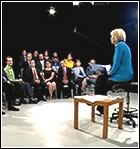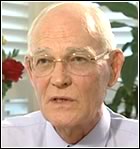- Caught in the middle
- By Reporter : Helen Dalley, Producer : Paul Steindl, Thea Dikeos
- Sunday program (Channel 9)
Page 1 of 5 - 07/03/2004 Make a Comment
- Contributed by: admin ( 100 articles in 2004 )

 Studio transcript of program
Studio transcript of program Transcript of studio forum
Transcript of studio forumOne of the most contentious issues in Australian society today is child custody - what happens to the children when families separate. This week, Sunday looks at some specific examples of how children and families are affected when relationships sour.
Sunday reveals the shocking fact that, out of one million children caught up in separated families, only 25,000 live in a shared arrangement. A staggering 300,000 children never see their non-custodial parent - usually a father. Although the Family Court often gets the blame, more often than not, it occurs when personal arrangements break down. Some fathers are denied access to their children when they want it, but many either don't want more than weekend access or, because of their inflexible work patterns or inappropriate living conditions, cannot manage anything near 50 per cent of the parenting. We explore these issues as well as the recommendations and results of the Federal Parliament's recent inquiry into the subject.
In Part 1, we meet several men from Dads in Distress, a group who discuss their problems weekly. Each meeting begins with a minute's silence for the five distressed fathers who, they say, commit suicide in Australia every day. Many, the group claims, are driven to this by the failings in the family law system. The men argue the system is biased toward women, giving mothers custody of children and men limited access even when they are paying a large amount of support money.
The call by these men's groups for equal or 50/50 shared parenting attracted John Howard's attention last year - and he was lobbied to right this perceived wrong. In response, the Prime Minister initiated the bi-partisan Parliamentary Committee which, in their final report, did not recommend the 50/50 model but did call for a major overhaul of the present Family Court system.
We talk to Shannon Bentley, who tells the story of how her three-year-old daughter was snatched off the street by her former partner before Christmas and is still missing. We also meet the Lehoczky family, who have made the legislated 50/50 model work. The four Lehoczky children in Canberra spend two weeks with their mother, followed by two weeks with their father. This arrangement only works because the former couple live near each other, and have put their differences aside for the sake of the children.
John Lehoczky, who together with his former wife, Julie Clark, has made this work, says it's a simple equation: you have to "love your children more than you love yourself; love your children more than you hate your ex".
 Retired Family Court judge Travis Lindenmayer says the Federal Government can't legislate to change human behaviour: "Every time there's an inquiry into family law they try to make amendments in the hope that people will change their behaviour, but they don't."
Retired Family Court judge Travis Lindenmayer says the Federal Government can't legislate to change human behaviour: "Every time there's an inquiry into family law they try to make amendments in the hope that people will change their behaviour, but they don't." Kathleen Swinbourne from the Sole Parents Union also argues shared parenting isn't always in the best interests of the child. Often prior to separation the mother is the primary carer, she says, "- so the court is trying to maintain stability so that after separation their main carer is still their mother and the children aren't thrown about between parents."
In Part 2, Sunday is in forum mode, talking to 25 people from all sides of this debate, including politicians, members of fathers' and women's groups, and lawyers, who face possible exclusion from the new tribunal that the government may set up in place of the Family Court.
We hear from one father who talks of his painful experience when his former partner took their child to the US, and then he was served with an apprehended violence order (AVO) "from the other side of the world". He believes the AVO was used as a weapon in her custody battle. He still has no access to his child and is at a loss as to what he can do next. Other fathers tell of the alleged misuse of AVOs by women in their quest to stop men getting a fair hearing in the Family Court.
There's also the sad story of the single mother who says her children's father doesn't really want more than occasional access and he has to be pushed by her to even keep up contact with his kids. She also says she receives only $5.00 a week or $2.50 per child from her former partner for child support.
 Another single mum told the forum she hadn't been paid one cent in child support from the father, yet the support bill is well over $20,000. Although she hasn't seen the father for years, and says he's paid nothing and done nothing for the child, she fears he could come back and use the law to gain access.
Another single mum told the forum she hadn't been paid one cent in child support from the father, yet the support bill is well over $20,000. Although she hasn't seen the father for years, and says he's paid nothing and done nothing for the child, she fears he could come back and use the law to gain access.The government would like to get lawyers and the adversarial nature of the contests out of the process so that a tribunal may take the place of the family court in deciding how custody or residency, as it's now referred to, is allotted. Any change is welcome, according to the people who either work in the system or have been through the family court. There are few happy stories at the end of the process or, as Wayne Swan, the Shadow Minister for Family and Community Services, puts it: "There are no winners here."
Transcript (program)
RAY LENTON, DADS IN DISTRESS: It's horrific. It's horrific. It's nothing short of horrific to go through that, you know. I died on Monday morning and I came back to life on Friday afternoons for quite a while.
DAVE TYKVART: It's just an abyss and it's up to you to grab on to the side and climb out. It's terrible, it's a horrible place you go to.
TONY MILLAR: We have a moment's silence to reflect on the fact that there are five males a day that suicide in this country. There's an empty chair over there to symbolise that.
HELEN DALLEY: These men say they're right in the midst of what they call a dark place where bitterness, recriminations, power and acrimony after separation take over. And children are often caught in the middle of warring parents.
GRAHAME BERRY: They talk about reasons for guys wanting to commit suicide. I've never been pushed to that limit but if you need more reason than having to walk away on the one day from your family, your wife, your child, most of your possessions with no realistic expectation of seeing much of it again. But when you walk away it's just a bewildering thing, you just don't know where to turn.
ERIC: Then after a period of time, for some reason, I didn't see her for three months. No matter how difficult it was for me, I know that it was probably 10 times worse for my kids.
HELEN DALLEY: Men's activist groups like this one, Dads in Distress, have argued loudly that there's a bias towards giving mothers custody - now known as residency - that fathers get a raw deal in the current family law system and that's bad for them and for children.
ERIC: You couldn't get him off me. It's amazing...it still hurts to see him like that.
HELEN DALLEY: The men's groups demand that politicians must legislate for dads to get equal parenting time.
DAVE TYKVART: You're a father and you're looked upon, you don't have the same feelings as a woman for your children but we do. Fathers love their children. You know, it's my duty as a father to protect and provide for my family.
JOHN HOWARD, PRIME MINISTER: Far too many young boys are growing up without proper male role models, Mr Speaker.
HELEN DALLEY: The dads' rights groups caught the ear of PM Howard last year.
JOHN HOWARD: There is a level of concern and unhappiness with the operation of matters relating to the custody of children following marriage breakdown.
HELEN DALLEY: Announcing a review of custody laws by a parliamentary committee, the Prime Minister raised the men's groups expectations that change would happen. But others believe that the cry for equal or 50/50 shared parenting is not in the best interests of all children.
KATHLEEN SWINBOURNE, SOLE PARENTS UNION: What the court is trying to do is look at the children's best interests and often that means trying to maintain the status quo. Prior to separation, their primary carer has been their mother so the court is trying to maintain that stability for children so that after separation their main carer is their mother as well and children aren't thrown about between parents too much.
RETIRED JUSTICE TRAVIS LINDENMAYER: In all of those cases which really create the problem, there is high conflict between the parents and the possibility of the children moving equally and spending equal time with the parents is just not there for the sake of the children. I mean, it just can't work for them.
HELEN DALLEY: Now retired, justice Travis Lindenmayer sat on the Family Court for 27 years and saw the most intractable conflicted cases.
RETIRED JUSTICE TRAVIS LINDENMAYER: Governments can't force shared parenting on parents. In reality, I don't think human behaviour can be altered significantly merely by legislation. Every time there's an inquiry into the Family Law Act they try to make amendments in the hope that people will change their behaviour, but they don't.
KATHLEEN SWINBOURNE: Only 3 per cent of separated or divorced couples have joint custody and I think this is because most couples realise that it's not the best thing for them, it's not best thing for their children. Shuffling children back and forth between houses takes a lot of work. It takes parents who can work together and it takes children who want that arrangement. Now if anyone of those factors is not present, the whole thing is going to fall down. And you don't have that in very many cases.
 Page 2
Page 2





1Will not be visible to public.
2Receive notification of other comments posted for this article. To cease notification after having posted click here.
3To make a link clickable in the comments box enclose in link tags - ie.<link>Link</link>.
4To show an image enclose the image URL in tags - ie.<image>https://fredspage.com/box.jpg</image>. Note: image may be resized if too large
To further have your say, head to our forum Click Here
To contribute a news article Click Here
To view or contribute a Quote Click Here